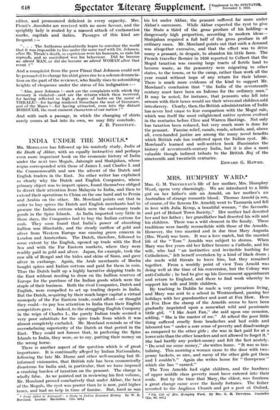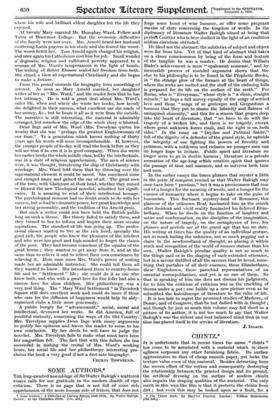MRS. HUMPHRY WARD.*
MRS. G. M. TREVELYAN'S life of her mother, Mrs. Humphry Ward, opens very charmingly. We are introduced to a little girl on her father's side an Arnold, on her mother's an Australian of strange romantic blood. Thomas Arnold (a son, of course, of the famous Dr. Arnold) went to Tasmania and fell in love with Julia Kemp, a beautiful woman, "the favourite and pet of Hobart Town Society." Her mother had deserted her and her father ; her grandfather had deserted his wife and his children. There was a wild element in the family. These traditions were hardly reconcilable with those of the Arnolds. However, the two married and in due time Mary Augusta (Mrs. Ward) was born. It was a love match, but the married life of the " Tom " Arnolds was subject to storms. When Mary was five years old her father became a Catholic, and his
wife, who had "an instinctive and invincible loathing for Catholicism," felt herself overtaken by a kind of black doom ; she made wild threats to leave him, but they remained together. From a worldly point of view Tom Arnold was doing well at the time of his conversion, but the Colony was anti-Catholic ; he had to give up his Government appointment and return to England, and there to find work whereby to support his wife and little children.
By teaching in Dublin he made a very precarious living, and Mary was sent to a school in Westmorland, passing her holidays with her grandmother and aunt at Fox How. Here at Fox How the stamp of the Arnolds seems to have been gradually imprinted upon a somewhat wild and passionate little girl. "I like Aunt Fan," she said upon one occasion, adding, "She is the master of me." At school the poor little thing suffered cruelly from headaches and bad colds and laboured too "under a sore sense of poverty and disadvantage as compared to the other girls ; she was in fact paid for at a lower rate than the other boarders and not allowed to forget it." She had hardly any pocket-money and felt the fact acutely. "Do send me some money," she writes home. "It was so tan- talizing. This morning a woman came to the door with two- penny baskets, so nice, and many of the other girls got them and I couldn't." Again she writes home for " threepence " which she has "earned."
The Tom Arnolds had eight children, and the _hardness of upper middle class poverty must have entered into their souls. But by the time that Mary, the eldest, was fourteen a great change came over the family fortunes. The father reverted to the Anglican Church and got a post at Oxford,
• The Life of Mrs. Bunsphry Ward. By Mrs. O. M. Treveiyan. Constable 112s. ed. net.]
where his wife and brilliant eldest daughter led the life they enjoyed.
At twenty Mary married Mr. Humphry Ward, Fellow and Tutor of Brasenose College. But the economic difficulties of the family were not over. Mrs. Arnold heard her husband muttering Latin prayers in his study and she feared the worst. 'File worst befell her. Tom Arnold again changed his religion, and once again his Catholicism cost him his job. Small wonder if dogmatic religion and cultivated poverty appeared to a woman of Mrs. Ward's temperament in the light of bonds. The -writing of Robert Elsmere sealed her freedom from both. She struck a blow at supernatural Christianity and she began to make a fortune.
From this period onwards the biography loses something of interest. As soon as Mary Arnold married, her daughter writes of her as "Mrs. Ward," and the reader feels that he has lost intimacy. He is told a great deal about Mrs. Ward's outer life, when and where she wrote her books, how keenly she delighted in their success, what excellent use she made of her money, &c., but he hears it all as it were from the outside. The narrative is still interesting, the material is admirably arranged, but somehow the edge of the whole story is blunted.
Dean Inge said of Mrs. Ward (Mrs. Trevelyan quotes his words) that she was "perhaps the greatest Englishwoman of our time." To a generation which knows nothing of thirty years ago his words will seem incomprehensible. If, however, the younger people of to-day will read the book before us they will see that if he errs it is in good company. When she wrote her earlier books the whole middle class, led by the intellectuals, was in a state of religious apprehension._ The men of science were, it was thought, threatening the ship of Christianity with wreckage. Mrs. Ward told them that by throwing over the supernatural element it could be saved. She convinced some and enraged many and gained the ear of all. The great men of the time, with Gladstone at their head, whether they cursed or blessed the new Theological novelist, admitted her signifi- cance. It is amazing to read of their intellectual homage. The psychological moment had no doubt much to do with her success, but so had her dramatic power, her great knowledge and her strong personality, and the tradition of the Arnold genii.
But such a writer could not have held the British public long on such a theme. Her theory failed to satisfy them, and they turned to her to inform and inspire their more secular aspirations. The standard of life was going up. The profes- sional classes wanted to live as the rich lived, specially the good rich, the people who knew the pleasures of the intellect and who were too good and high-minded to forget the claims of the poor. They had become conscious of the squalor of the great towns ; they wanted to get away from it, and at the same time to relieve it and to relieve their own consciences by relieving it. Here once more Mrs. Ward's power of writing made her an admirable instructor. She could tell them all they wanted to know. She introduced them to country-house life and to " Settlement " life ; she could do it as one who knew both, and who with a great love for fine folks had also a sincere love for slum children. Her philanthropy was a very real thing. The "Mary Ward Settlement" in Tavistock Square still does excellent work and could do more if those who care for the diffusion of happiness would help its ably- organized clubs a little more generously.
A public hungry for "advancement," social, moral and intellectual, devoured her works. So did America, full of youthful curiosity, concerning the ways of the Old Country. Mrs. Trevelyan supplies Dean Inge with many arguments to justify his opinions and leaves the reader to come to his own conclusion. By her deeds he will have to judge the novelist. Mrs. Trevelyan fails to make what must have been her magnetism felt. The fact that with this failure she has succeeded in making the recital of Mrs. Ward's working hours, her social life and her philanthropy interesting pro- claims the book a very good if not a first-rate biography.
CECILIA TOWNSEND.



























































 Previous page
Previous page